August 2024 Newsletter

New Research Reveals Long Medi-Cal Call Wait Times, Undermining Access to Coverage

We know that keeping Medi-Cal coverage is not easy. Many people lose their coverage not because they no longer qualify but because of administrative barriers, such as not being able to connect with a Medi-Cal worker over the phone to renew their coverage.
After hearing from families in focus groups and from Medi-Cal enrollment assisters that enrollees are consistently experiencing long call wait times trying to get through to county Medi-Cal workers, The Children’s Partnership commissioned WestGroup Research to survey wait times on county call lines.
What we found was consistent with what we’ve been hearing: Average wait times were about an hour across the state, with several large counties experiencing wait times at double that length, as well as a huge dropped-call rate due to high volume.
“Keeping Medi-Cal coverage is essential to the health and economic stability of California families,” said Mayra E. Alvarez, president of The Children’s Partnership. “Public programs should work for the public. How can we expect families to renew their coverage when they must wait up to two hours to connect with Medi-Cal or the call is dropped? Who has that time to dedicate to staying on the phone during the work day, especially people who have jobs with inflexible schedules? That’s not access.”
Keeping Medi-Cal coverage for children and their families requires a program that works. This seminal research is evidence that something must be done to help our California families stay enrolled in Medi-Cal. SB 1289 (Roth), co-sponsored by our partner Western Center on Law & Poverty, would provide an important step toward accountability and making Medi-Cal work better for families by requiring the California Department of Health Care Services to collect and report county call system data. Fortunately, this bill passed out of the Assembly Appropriations Committee earlier this month and will go to a floor vote ahead of the end of this year’s legislative session on Aug. 31.

Vote ‘No’ on Prop 35 this November
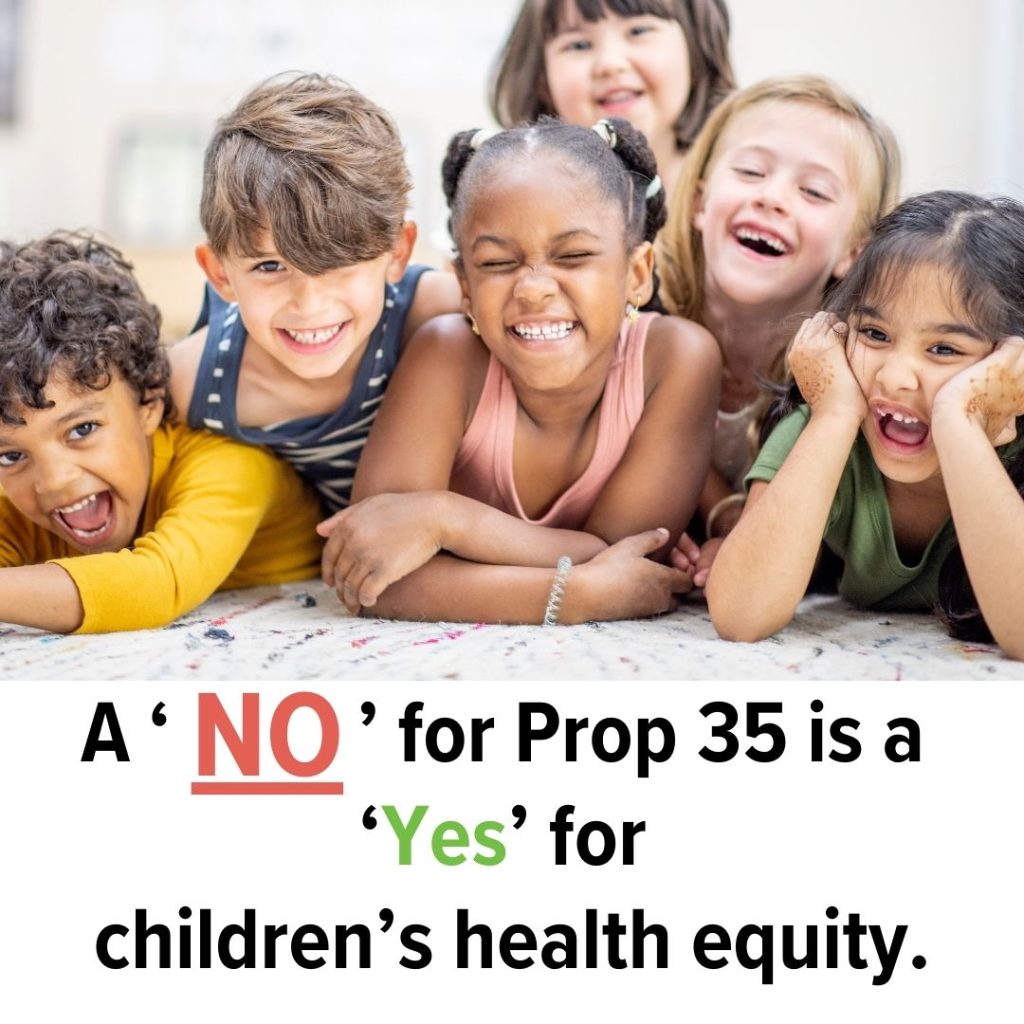
As we mentioned in last month’s newsletter, The Children’s Partnership is grateful that the 2024-25 state budget included funding to implement the multi-year continuous Medi-Cal coverage protection for children from birth to age 5.
Unfortunately, this policy – and many other programs and initiatives that support people on Medi-Cal, including a living wage rate increase for community health workers – would be rendered “inoperative” if Proposition 35 passes this November.
Prop 35 directs revenue raised from the Managed Care Organization tax to fund rate increases for a limited number of Medi-Cal providers, forever limiting the Legislature’s ability to use any of those funds for other budget needs – even if those needs include other Medi-Cal supports.
TCP strongly supports the MCO tax and increasing provider rates. There is no question that California pays far too little to providers participating in Medi-Cal, hindering health care access for millions of Californians and disproportionately impacting children and families of color who are more likely to depend on Medi-Cal for coverage.
However, TCP opposes Prop 35 because of its restriction on how the MCO tax revenue funds can be used, the caps on the tax, and who the decision makers are in making those determinations.

New Law Benefits Youth Access to Mental Health Care
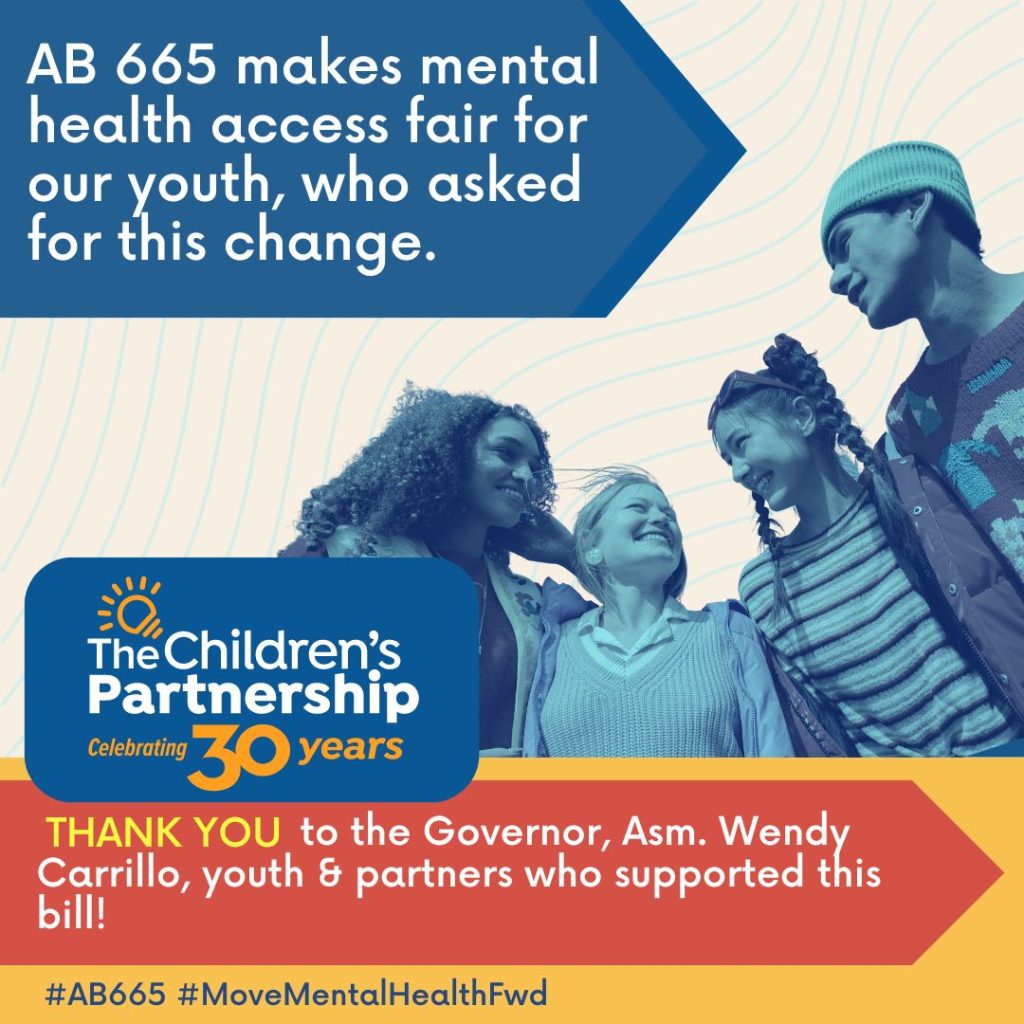
AB 665 Minors: Consent to Mental Health Services was signed by Gov. Newsom in October 2023 and went into effect on July 1, 2024. Co-sponsored by The Children’s Partnership and other youth advocates, AB 665 removed significant barriers for youth ages 12 and older enrolled in Medi-Cal to consent to their own mental health care without requiring additional parental consent, if the therapist and the youth deem it appropriate.
Access to timely, confidential care can be necessary for young people, especially LGBTQ+ youth who may not live in supportive households. Prior to AB 665, youth on Medi-Cal had to display an exceptional need to consent to their own care, such as being at risk for suicide, unlike their peers on private insurance. AB 665 addresses this inequity by aligning the standards across both Medi-Cal and private insurance, ensuring that youth seeking mental health care are treated equally regardless of their insurance type.
To learn more about AB 665, read this FAQ jointly developed by The Children’s Partnership, National Center for Youth Law, National Health Law Program, California Alliance of Child and Family Services, and California School-Based Health Alliance. TCP will be publishing a youth-friendly flyer about AB 665, and the Department of Health Care Services will also be releasing guidance for implementation in the near future.
Back-to-School Resource: 988 Suicide & Crisis Lifeline Fact Sheet
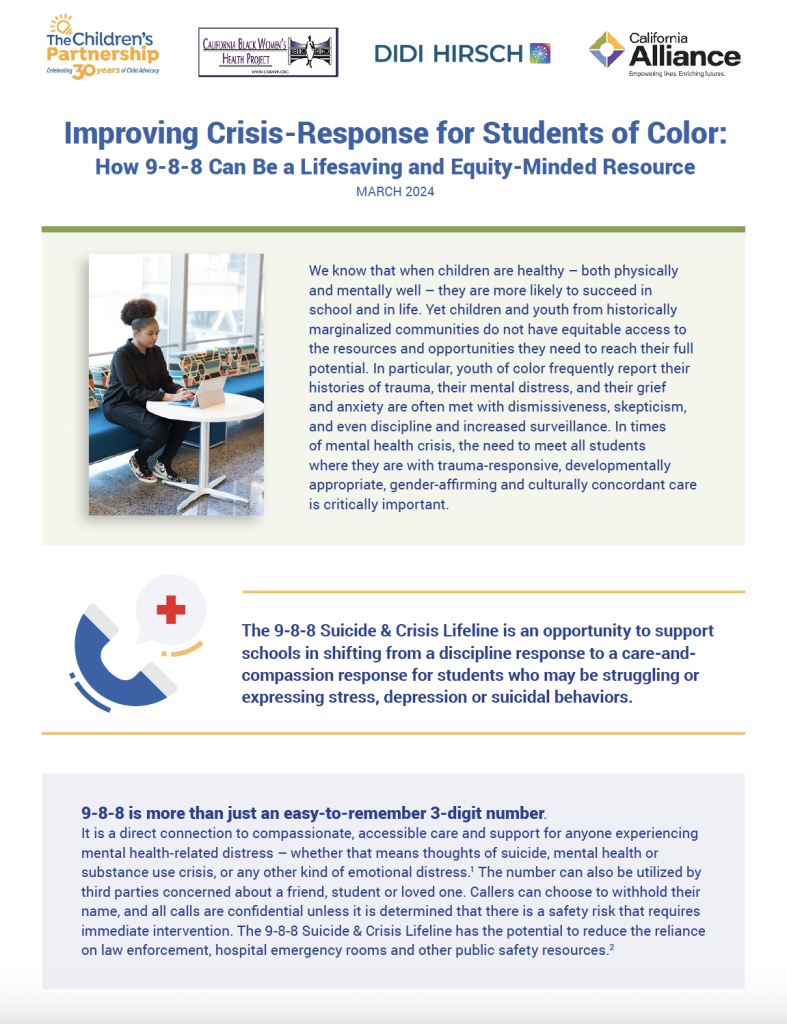
As our children start another school year, we want to remind you that we have a 988 Suicide & Crisis Lifeline Fact Sheet to use in raising awareness about this important resource.
The 988 Lifeline provides compassionate, accessible care and support for people experiencing mental health-related distress.
Our fact sheet is a valuable resource for community-based organizations and schools. It outlines the importance of shifting from a discipline response to a care-and-compassion response for students struggling with stress, depression or suicidal behaviors, and offers practical guidance on how schools can implement 988 as part of their suicide prevention and mental health policies and protocols.
This fact sheet was created in partnership with California Black Women’s Health Project, Didi Hirsch, and The California Alliance of Child and Family Services.

Mayra E. Alvarez Testifies on Prop 35

On Aug. 13 at a joint hearing of the California Assembly and Senate Health Committees, TCP President Mayra E. Alvarez provided testimony that outlined TCP’s opposition to Proposition 35, including how Prop 35 redirects billions of dollars that currently support Medi-Cal and the state’s general fund to just a handful of specific providers, caps the MCO tax rate for commercial health plans, and excludes community voices.
Other organizations that expressed serious concerns about Prop 35 included California Pan-Ethnic Health Network, Commonwealth Adult Day Health Care Center, and AIDS Healthcare Foundation.
TCP Priority Bills: Progress on Major Issues, Medi-Cal Call Center Bill Headed for Floor Vote
On Aug. 15, bills before the California Legislature faced a critical deadline to be passed out of appropriations committees and move onto floor votes ahead of the Aug. 31 conclusion of this year’s legislative session.
We are thrilled that one of TCP’s priority bills – SB 1289 (Roth), which addresses Medi-Cal call wait times – passed out of the Assembly Appropriations Committee and will continue moving through the legislative process! (See above for more information on TCP’s recent research on this subject.)
Unfortunately, another of TCP’s priority bills – AB 2239 (Bonta) to address digital discrimination – was held in the Senate Appropriations Committee and will no longer move forward this session. TCP and our allies at the California Alliance for Digital Equity have been fighting an uphill battle against strident and well-funded opposition from the industry that profits from the inequitable status quo. We are heartened to have successfully passed the bill through six committees prior to this month in the face of this opposition. While we are disappointed that this year’s effort has come to an end, we are more determined than ever to keep up this fight. Get a first look at an upcoming documentary about this campaign, which is far from over!
TCP’s Early Childhood Development Team Attends Black ECE Symposium
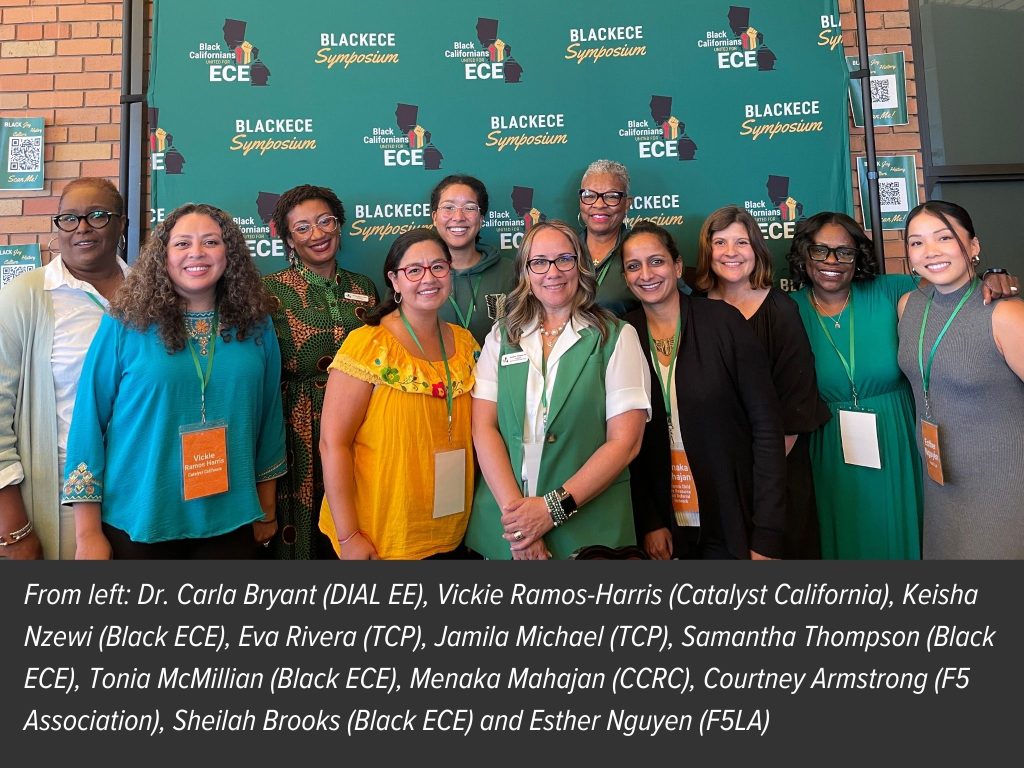
TCP’s early childhood development team, Policy Director Eva Rivera and Policy Associate Jamila Michael, along with other members of the Whole Child Equity Partnership, attended the Black ECE Symposium hosted by Black Californians United for Early Care and Education August 9-10 in Sacramento. The TCP team was honored to be able to join early childhood educators, researchers, policymakers, advocates, families and community stakeholders in a collective effort to enhance Black early care and education. This event fostered collaboration and innovation, ensuring our early learning and care systems are loving, safe, engaging and culturally affirming for Black children.

SAVE THE DATE: TCP’s Final 30th Anniversary Celebration!
You’re invited to join us on the evening of October 22 in Downtown Los Angeles to celebrate the closing event of TCP’s 30th Anniversary Speaker Series. As election season ramps up, we’ll be chatting with a diverse panel of advocacy leaders about the progress we’ve made over the past 30 years and how we’ll continue to build a strong, multiracial democracy for our children. This is sure to be an inspiring and fun time! Details to come.
Whole Child Equity Partnership: Understanding California’s Birth Options Webinar Series
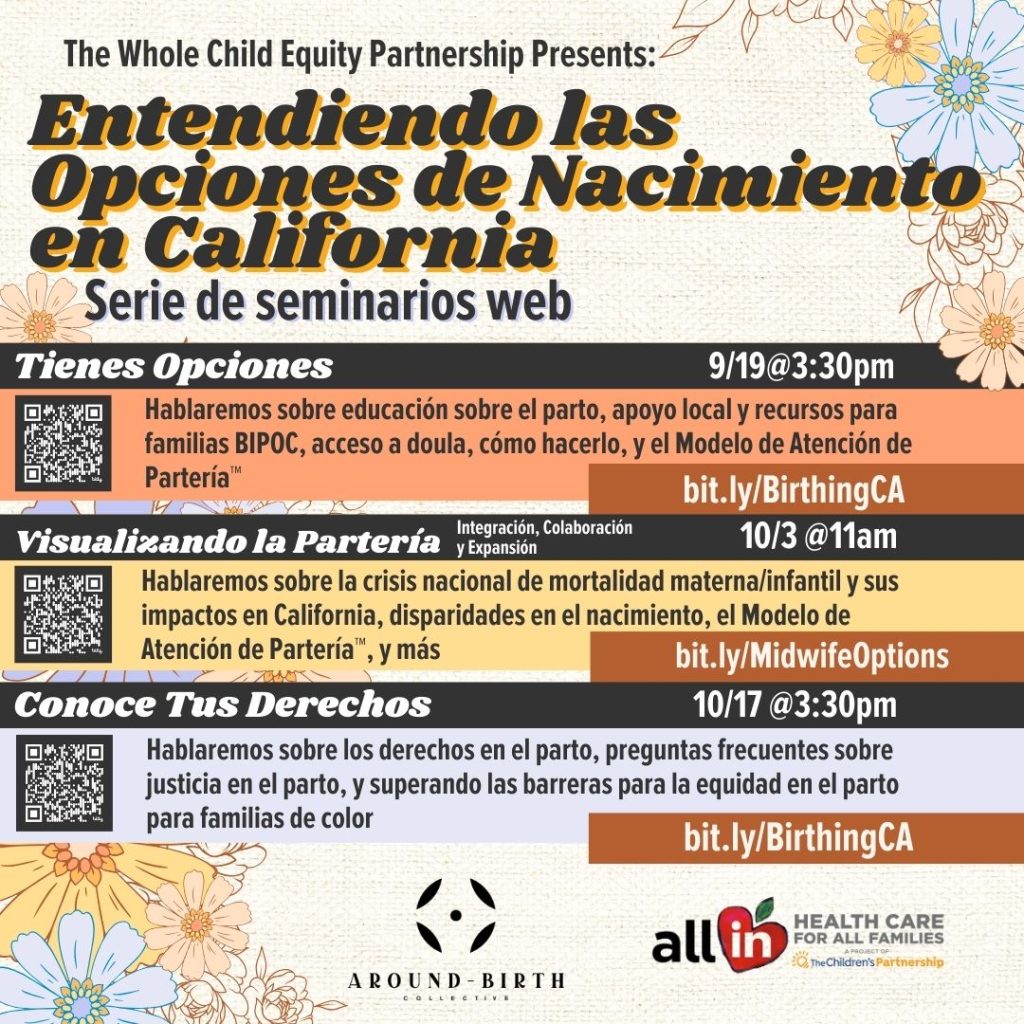
The Whole Child Equity Partnership’s Health Workgroup invites you to join a series of conversations with doulas, community members and legal professionals to discuss California birth options.
California is currently experiencing a maternity care and maternal/infant mortality care crisis. We will clearly communicate the importance of the Midwifery Model of Care™, share information on childbirth education options, informed decision making and knowing your rights in a birth space setting – all in support of a safe and affirming childbirth experience for BIPOC families.
You Got Options
We’ll discuss childbirth education, local support and resources for BIPOC families, doula access, how to’s, and the Midwifery Model of Care™.
Thursday, September 19, 2024
3:30-5 p.m
Envisioning Midwifery Integration, Collaboration and Expansion
We’ll discuss the national maternal/infant mortality crisis and its impacts in California, birth disparities, the Midwifery Model of Care™, and more.
Thursday, October 3, 2024
11 a.m.-1 p.m.
Know Your Rights
We’ll discuss birthing rights, FAQs on birth justice, and overcoming barriers to birth equity for birthing families of color.
Thursday, October 17, 2024
3:30-5 p.m.
Somos Latine Families Virtual Conversation Series Returns!
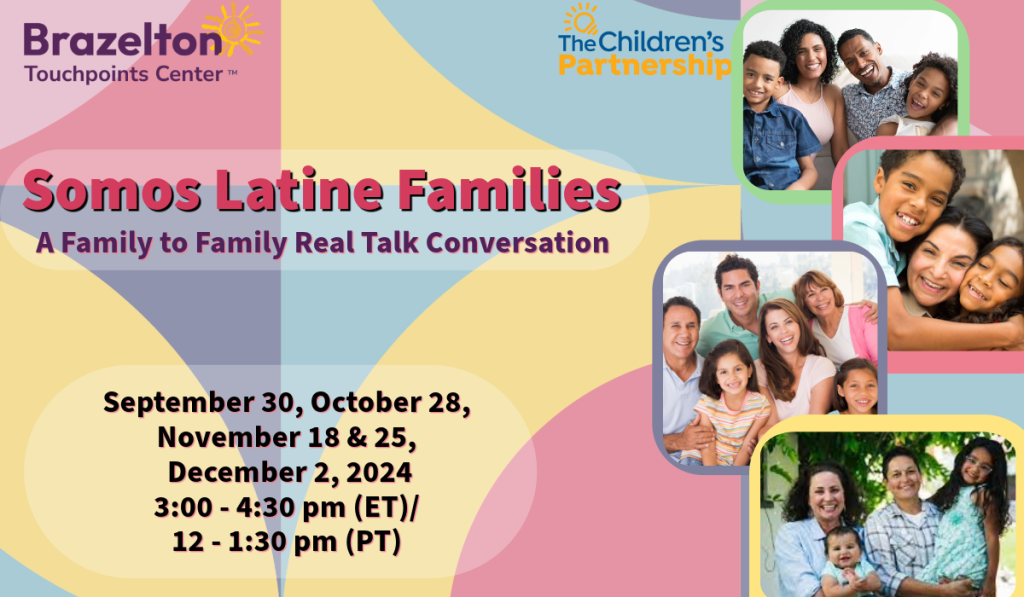
This free, 5-episode virtual conversation series offers a safe and welcoming space to hold conversations for and by Latine families. Explore what it means to be a parent as part of the Latine community, raising Latine children while navigating U.S. mainstream cultures, and connecting Latine cultural identities to physical and mental well-being.
Somos Latine Families is moderated by Eva Rivera, TCP policy director for early childhood development and Brazelton Touchpoints Center national facilitator.
Series Details:
- Dates: Five Mondays from Sept. 30 through Dec. 2
- Times: 12-1:30 p.m. PT
- Format: Each webinar is 1 hour followed by a 30-minute Q&A session with parent panelists

TCP Research on Medi-Cal Call Wait Times, Mayra Alvarez in Los Angeles Times
The Los Angeles Times featured TCP’s survey study on Medi-Cal call wait times, which found an average wait time of an hour across all California counties. “Where somebody lives shouldn’t determine the access that they have when getting their Medi-Cal questions answered. Everyone should have the same high-quality experience…For many low-income families, for many immigrant families, the phone is going to be a critical source of connection to services, and so we need to make sure that those phone lines are working for families,” TCP President Mayra E. Alvarez said. This article also appeared in KFF Health News, Yahoo! News and Natura Hoy (Spanish). The research was covered by Radio Korea (Korean), County of San Diego, Uniradio Informa (Baja California) and OPEN MINDS.
